John Deere 540M Loader

| Make | John Deere |
| Model | 540M |
| Type | Front End Loaders for Tractors |
Your Preferred Location
Description
- Superior strength and visibility
- For heavy-duty chores
- Parking stands are integrated on the loader
Models
Loader removal (parking) made easy
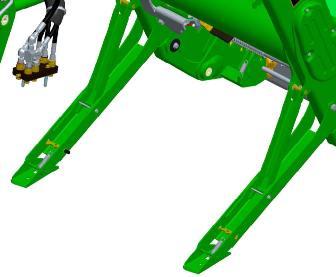 Parking stands
Parking stands

John Deere loaders are easily removed and reinstalled on tractors without tools. The parking system allows removing or attaching the loader to the tractor in minutes without the need for tools.
To remove or park the loader, apply slight down pressure to the loader boom with the bucket dumped at approximately a 30-degree angle. With the tractor in park, lower the parking stands and place the mast pins in the open position.
Removing or parking the loader
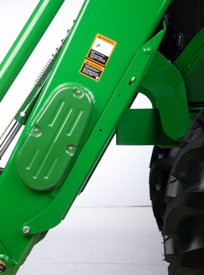 Parking stand in stored position
Parking stand in stored position
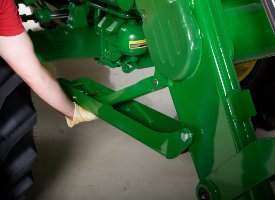 Removing parking stand
Removing parking stand
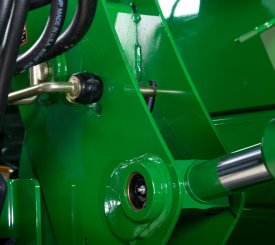 Mast pin in the closed position
Mast pin in the closed position
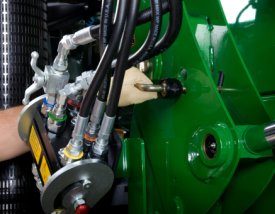 Rotating mast pin to the open position
Rotating mast pin to the open position
Utilizing the boom circuit with the tractor in neutral, rotate the mast forward until the mast has rotated past the pin location on the mounting frame by extending the lift cylinder. Now using the bucket circuit, roll back the bucket until the mast is removed from the pocket and will clear the tires.
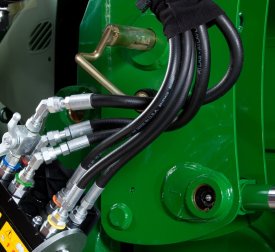 Mast pin in the open position
Mast pin in the open position
 Masts rotate forward, then bucket rolled back
Masts rotate forward, then bucket rolled back
With the tractor in park, shut the engine off and relieve the hydraulic pressure as indicated for the tractor (rotating the joystick). Disconnect or open the single-point hydraulic connector (or remove couplers if no single point is installed).
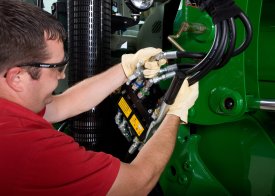 Disconnect/open single-point hydraulic connection
Disconnect/open single-point hydraulic connection
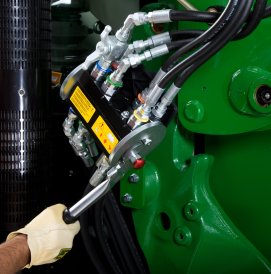 Disconnect/open single-point hydraulic connections
Disconnect/open single-point hydraulic connections
Store the loader half of the single-point connector or hoses, and back away from the loader.
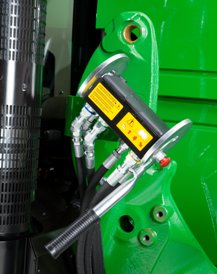 Single-point hydraulics disconnected
Single-point hydraulics disconnected

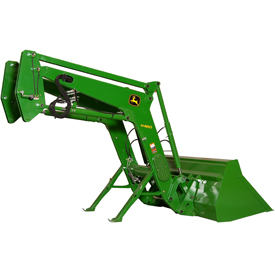 Parked loader
Parked loader
Boom lockout for easy service
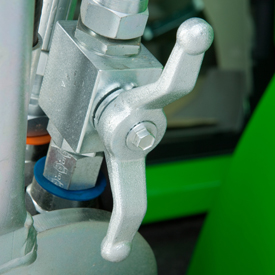 Hydraulic shut-off valve (open position)
Hydraulic shut-off valve (open position)
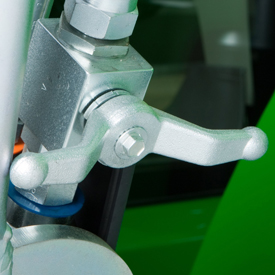 Hydraulic shut-off valve (closed position)
Hydraulic shut-off valve (closed position)
A hydraulic shut-off valve is included with the H-Series Ag Loaders to ensure the loader does not lower suddenly. For example, this allows the boom to be locked out when someone is required to be located under the loader boom for service work on the tractor. It should not be used for extended periods of time unless an appropriate support stand is also utilized.
False rod bucket cylinders improve productivity
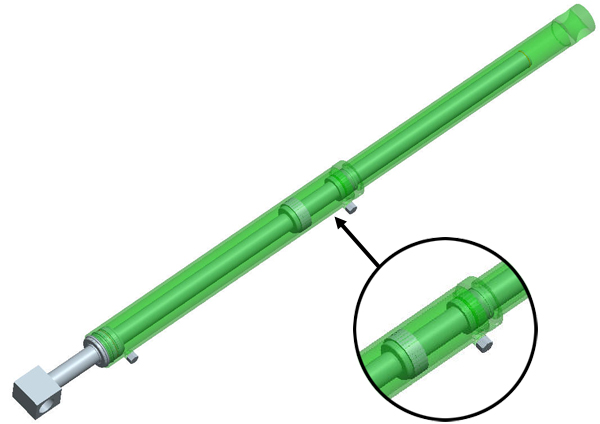 False rod cylinder
False rod cylinder

Fast bucket cycle times are important to dump the load from the bucket as quickly as possible, in order to be as productive as possible, while completing loading operations. The bucket cylinder design can have a major impact on this cycle time, especially for the mechanical self-leveling (MSL) loaders.
Therefore, all MSL M- and H-Series Loaders utilize false rod bucket cylinders. A false rod cylinder has a smaller displacement of oil requirement on the head end of the cylinder, which allows this cylinder to dump much faster than a normal cylinder.
Loader suspension system (LSS) to enhance the ride
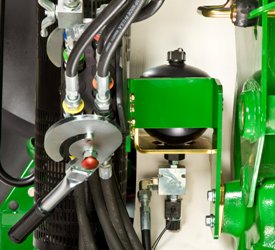 Nitrogen-charged accumulator and electric valve
Nitrogen-charged accumulator and electric valve
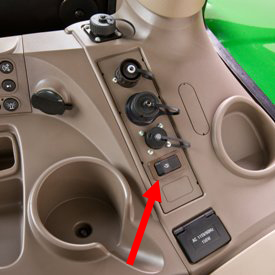 Operator on/off switch
Operator on/off switch
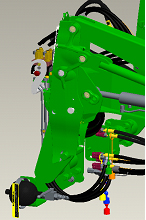 LSS on H180
LSS on H180
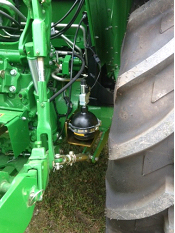 LSS on 5E and 5M
LSS on 5E and 5M
An enhancement to the loader is the suspension system. A great level of loader productivity is achieved with the LSS.
- An accumulator charged with nitrogen and connected to the head-end lift cylinder hose through a T-fitting provides shock absorption
- The cylinders move in and out to allow the boom to float
Performance
- Bales can be transported more efficiently from one end of the field to the other over frozen, hard-packed, or rutted terrain.
NOTE: Check bale-handling capability of tractor before use.
- Pallets can be moved easily without sustaining cargo damage
- Pallets of seed or fertilizer can be carried across a yard without a bag spilling and creating a costly mess
- A properly-ballasted tractor with LSS has increased stability, creating a smoother ride for the operator
Cost of ownership
-
Extended life of loader pins and bushings
-
Less stress on tractor axle
Reasons for turning LSS off include:
- Digging applications - with LSS on, the cylinders retract slightly, losing lifting power
- Holding a grade when blading - with LSS on, it is difficult to hold a constant grade
- Precise pallet and bale handling - with LSS on, the load moves up and down slightly while being positioned
- Parking a loader - with LSS on, when down pressure is applied, the lift cylinders retract slightly, making it more difficult to park
The switch is conveniently located in the operator station to avoid having to exit the tractor seat to manually move the handle on the LSS.
LSS can also be ordered with a manual shutoff. Depending on the tractor/loader model, the accumulator is located in different places. On the 440R, the accumulator is mounted outside the bottom of the mounting frame. On the 5 Series Tractors, the accumulator is mounted near the inside of the rear right wheel. On 6 Series tractors and larger, it is mounted in between the hydraulic connection and the mounting frame.
Single-point hydraulic connection saves time
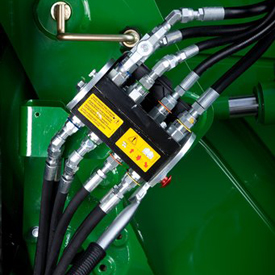 Single-point hydraulic connection on row-crop tractor (closed)
Single-point hydraulic connection on row-crop tractor (closed)
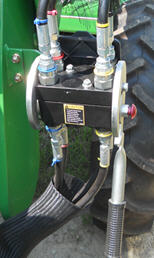 Single-point hydraulic connection on utility tractor (closed)
Single-point hydraulic connection on utility tractor (closed)
The 520M, 540M, H240, H260, and H310 Loaders can be ordered with a single-point hydraulic connection that also incorporates the connection point for any electrical needs. To disconnect the hydraulic connection between the loader and the tractor, it is necessary to relieve the hydraulic system oil pressure on the tractor.
Concealed oil lines improve appearance and reduce damage
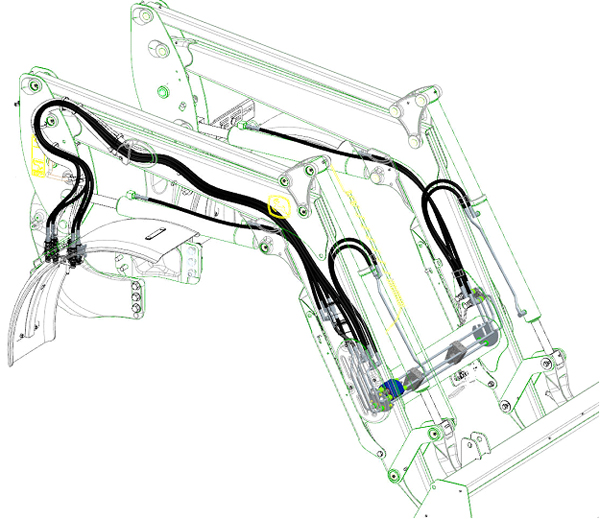 Concealed oil lines through boom arm
Concealed oil lines through boom arm

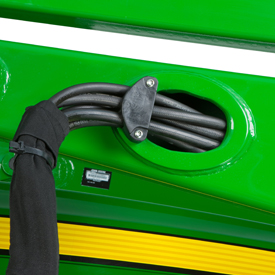 Oil lines routed through the boom arm
Oil lines routed through the boom arm
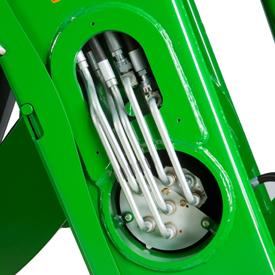 Oil lines routed through the torque tube
Oil lines routed through the torque tube
Over time, increased width in tractor hoods have caused issues with available space for running traditional oil lines of a loader along the boom, making them more susceptible to damage.
To improve this situation, the oil lines have been routed through the boom arm and the torque tube, improving line protection and the appearance of the loader.
Specifications
- Key Specs - Boom breakout force: Measured at pivot (Y)<br/>2671 kg<br/>
- Key Specs - Bucket rollback force capacity: At ground-level line (ZZ)<br/>3046 kg<br/>
- Key Specs - Clearance at full height - bucket dumped (C): 2538 mm<br/>100 in.
- Key Specs - Dump angle, degrees (E): -74 degree (angle)
- Key Specs - Lift capacity at full height: Measured at pivot (U)<br/>1373 kg<br/>3027 lb<br/>
- Key Specs - Maximum lift height (A): 3578 mm<br/>141 in.
- Key Specs - Rollback angle, degrees (G): 42 degree (angle)
- Loader - Base weight: 1028.2 kg
- Loader - Boom breakout force: Measured at pivot (Y)<br/>2671 kgf<br/>Measured at 800 mm ahead of pivot (Z)<br/>2325 kg<br/>
- Loader - Bucket angle: Dump angle, degrees (E)<br/>-74 degree (angle)<br/>Rollback angle, degrees (G)<br/>42 degree (angle)<br/>Dump angle, ground<br/>-96 degree (angle)<br/>
- Loader - Bucket rollback force capacity: At maximum height (VV)<br/>1636 kg<br/>At 59-in. (1500-mm) lift height (XX)<br/>2986 kg<br/>At ground-level line (ZZ)<br/>3046 kg<br/>
- Loader - Bucket used: Materials 1850 mm<br/>Materials 73 in.
- Loader - Bucket weight: 246 kg<br/>542 lb
- Loader - Cycle times: Loader raise, seconds<br/>3.4 seconds<br/>Loader lower, seconds<br/>2.5 seconds<br/>Bucket dump, seconds<br/>2.1 seconds<br/>Bucket rollback, seconds<br/>2.1 seconds<br/>
- Loader - Digging depth (H): 47 mm<br/>1.9 in.
- Loader - Dimensions: Maximum lift height (A)<br/>3578 mm<br/>141 in.<br/>At full height - bucket level(B)<br/>3383 mm<br/>133 in.<br/>At full height - bucket dumped (C)<br/>2538 mm<br/>100 in.<br/>
- Loader - Leveling configuration: Mechanical Self Leveling (MSL)
- Loader - Lift capacity at 59 in. (1500 mm): Measured at pivot (W)<br/>2015 kg<br/>Measured at 800 mm ahead of pivot (X)<br/>1931 kg<br/>
- Loader - Lift capacity at full height: Measured at pivot (U)<br/>1373 kg<br/>3027 lb<br/>Measured at 800 mm ahead of pivot (V)<br/>1481 kg<br/>
- Loader - Overall length (I+F), ft (m): 4.8 m<br/>15.8 ft
- Loader - Reach: At maximum height (D)<br/>1011 mm<br/>39.8 in.<br/>At ground level - bucket level (F)<br/>2426 mm<br/>95.5 in.<br/>
- Tractor - Front axle configuration: MFWD
- Tractor - Front tire: 14.9R24
- Tractor - Model: 6135E
- Tractor - Pump capacity: 75.7 L/min<br/>20 gpm
- Tractor - Rated pressure: 195 bar<br/>2828 psi
- Tractor - Rear tire: 18.4R38
- Tractor - Wheelbase: 2380 mm<br/>94 in.
Features
- Lift Capacity: NSL: 2394-2666 lbs (1088-1212 kg) MSL: 3117.3-3309.1 lbs (1414-1501 kg)
- Lift Height: NSL: 137-141 in. (3.482-3.571 m) MSL: 138-141 in. (3.501-3.578 m)
Copy Set
Loader removal (parking) made easy
 Parking stands
Parking stands

John Deere loaders are easily removed and reinstalled on tractors without tools. The parking system allows removing or attaching the loader to the tractor in minutes without the need for tools.
To remove or park the loader, apply slight down pressure to the loader boom with the bucket dumped at approximately a 30-degree angle. With the tractor in park, lower the parking stands and place the mast pins in the open position.
Removing or parking the loader
 Parking stand in stored position
Parking stand in stored position
 Removing parking stand
Removing parking stand
 Mast pin in the closed position
Mast pin in the closed position
 Rotating mast pin to the open position
Rotating mast pin to the open position
Utilizing the boom circuit with the tractor in neutral, rotate the mast forward until the mast has rotated past the pin location on the mounting frame by extending the lift cylinder. Now using the bucket circuit, roll back the bucket until the mast is removed from the pocket and will clear the tires.
 Mast pin in the open position
Mast pin in the open position
 Masts rotate forward, then bucket rolled back
Masts rotate forward, then bucket rolled back
With the tractor in park, shut the engine off and relieve the hydraulic pressure as indicated for the tractor (rotating the joystick). Disconnect or open the single-point hydraulic connector (or remove couplers if no single point is installed).
 Disconnect/open single-point hydraulic connection
Disconnect/open single-point hydraulic connection
 Disconnect/open single-point hydraulic connections
Disconnect/open single-point hydraulic connections
Store the loader half of the single-point connector or hoses, and back away from the loader.
 Single-point hydraulics disconnected
Single-point hydraulics disconnected

 Parked loader
Parked loader
Boom lockout for easy service
 Hydraulic shut-off valve (open position)
Hydraulic shut-off valve (open position)
 Hydraulic shut-off valve (closed position)
Hydraulic shut-off valve (closed position)
A hydraulic shut-off valve is included with the H-Series Ag Loaders to ensure the loader does not lower suddenly. For example, this allows the boom to be locked out when someone is required to be located under the loader boom for service work on the tractor. It should not be used for extended periods of time unless an appropriate support stand is also utilized.
False rod bucket cylinders improve productivity
 False rod cylinder
False rod cylinder

Fast bucket cycle times are important to dump the load from the bucket as quickly as possible, in order to be as productive as possible, while completing loading operations. The bucket cylinder design can have a major impact on this cycle time, especially for the mechanical self-leveling (MSL) loaders.
Therefore, all MSL M- and H-Series Loaders utilize false rod bucket cylinders. A false rod cylinder has a smaller displacement of oil requirement on the head end of the cylinder, which allows this cylinder to dump much faster than a normal cylinder.
Loader suspension system (LSS) to enhance the ride
 Nitrogen-charged accumulator and electric valve
Nitrogen-charged accumulator and electric valve
 Operator on/off switch
Operator on/off switch
 LSS on H180
LSS on H180
 LSS on 5E and 5M
LSS on 5E and 5M
An enhancement to the loader is the suspension system. A great level of loader productivity is achieved with the LSS.
- An accumulator charged with nitrogen and connected to the head-end lift cylinder hose through a T-fitting provides shock absorption
- The cylinders move in and out to allow the boom to float
Performance
- Bales can be transported more efficiently from one end of the field to the other over frozen, hard-packed, or rutted terrain.
NOTE: Check bale-handling capability of tractor before use.
- Pallets can be moved easily without sustaining cargo damage
- Pallets of seed or fertilizer can be carried across a yard without a bag spilling and creating a costly mess
- A properly-ballasted tractor with LSS has increased stability, creating a smoother ride for the operator
Cost of ownership
-
Extended life of loader pins and bushings
-
Less stress on tractor axle
Reasons for turning LSS off include:
- Digging applications - with LSS on, the cylinders retract slightly, losing lifting power
- Holding a grade when blading - with LSS on, it is difficult to hold a constant grade
- Precise pallet and bale handling - with LSS on, the load moves up and down slightly while being positioned
- Parking a loader - with LSS on, when down pressure is applied, the lift cylinders retract slightly, making it more difficult to park
The switch is conveniently located in the operator station to avoid having to exit the tractor seat to manually move the handle on the LSS.
LSS can also be ordered with a manual shutoff. Depending on the tractor/loader model, the accumulator is located in different places. On the 440R, the accumulator is mounted outside the bottom of the mounting frame. On the 5 Series Tractors, the accumulator is mounted near the inside of the rear right wheel. On 6 Series tractors and larger, it is mounted in between the hydraulic connection and the mounting frame.
Single-point hydraulic connection saves time
 Single-point hydraulic connection on row-crop tractor (closed)
Single-point hydraulic connection on row-crop tractor (closed)
 Single-point hydraulic connection on utility tractor (closed)
Single-point hydraulic connection on utility tractor (closed)
The 520M, 540M, H240, H260, and H310 Loaders can be ordered with a single-point hydraulic connection that also incorporates the connection point for any electrical needs. To disconnect the hydraulic connection between the loader and the tractor, it is necessary to relieve the hydraulic system oil pressure on the tractor.
Concealed oil lines improve appearance and reduce damage
 Concealed oil lines through boom arm
Concealed oil lines through boom arm

 Oil lines routed through the boom arm
Oil lines routed through the boom arm
 Oil lines routed through the torque tube
Oil lines routed through the torque tube
Over time, increased width in tractor hoods have caused issues with available space for running traditional oil lines of a loader along the boom, making them more susceptible to damage.
To improve this situation, the oil lines have been routed through the boom arm and the torque tube, improving line protection and the appearance of the loader.

